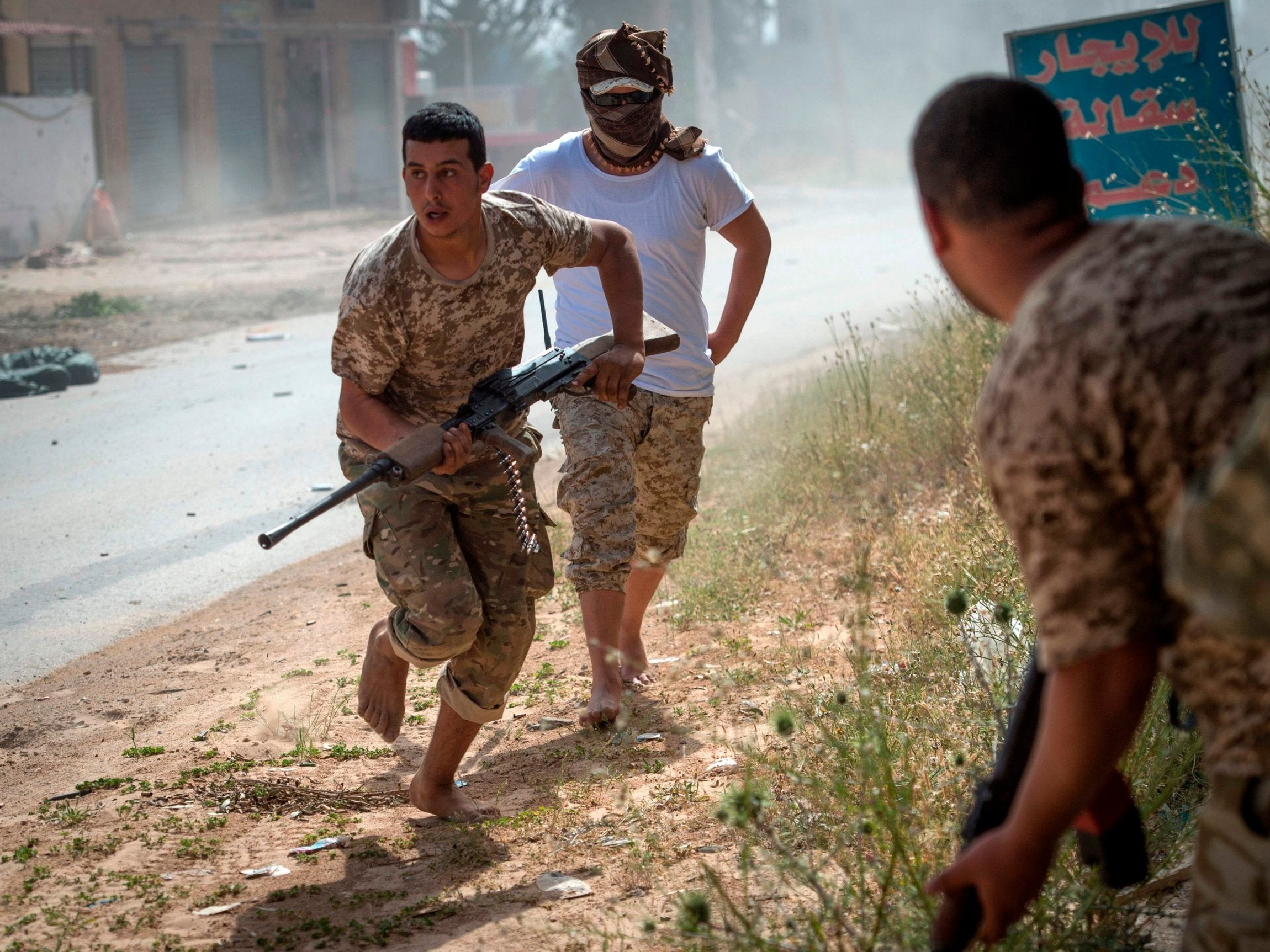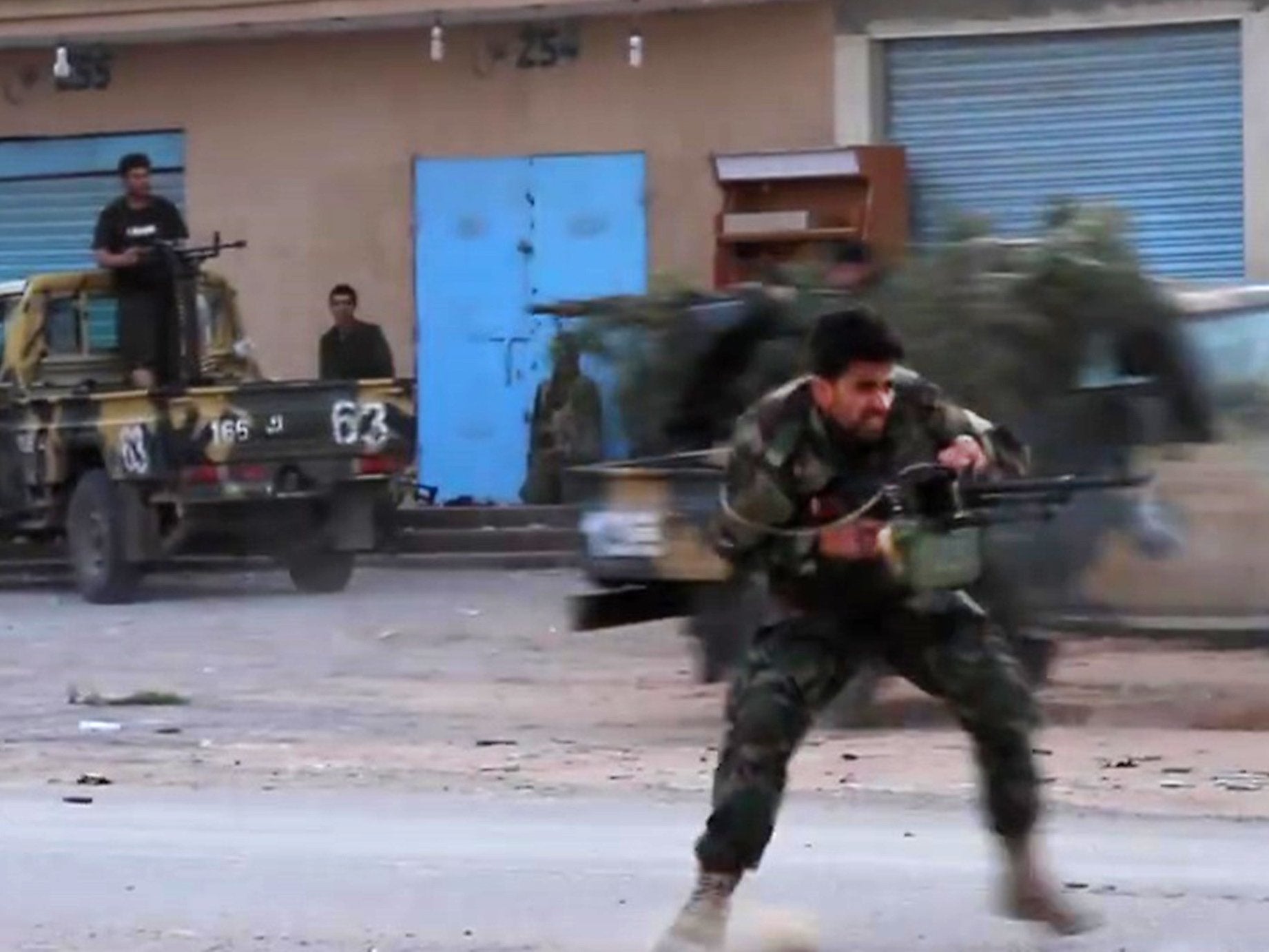Libya: UN-backed government defending capital from warlord Haftar now using drones on front lines
The Battle for Tripoli - Exclusive: 'The Government of National Accord forces have succeeded in foiling Haftar’s offensive. The next phase is the GNA is advancing in terms of military tactics'
Your support helps us to tell the story
From reproductive rights to climate change to Big Tech, The Independent is on the ground when the story is developing. Whether it's investigating the financials of Elon Musk's pro-Trump PAC or producing our latest documentary, 'The A Word', which shines a light on the American women fighting for reproductive rights, we know how important it is to parse out the facts from the messaging.
At such a critical moment in US history, we need reporters on the ground. Your donation allows us to keep sending journalists to speak to both sides of the story.
The Independent is trusted by Americans across the entire political spectrum. And unlike many other quality news outlets, we choose not to lock Americans out of our reporting and analysis with paywalls. We believe quality journalism should be available to everyone, paid for by those who can afford it.
Your support makes all the difference.Armed groups defending Libya’s capital from an offensive by Egyptian and Emirati-backed warlord Khalifa Haftar have obtained drones for the first time and begun to deploy them along the front lines, a senior official told The Independent.
Khaled al-Meshri, president of Libya’s High Council, confirmed in an interview that the United Nations-backed Government of National Accord had obtained unmanned drones in the last few days and modified them to counter the devastating effect of Mr Haftar’s war planes and aerial surveillance capabilities.
“Yes, we have drones,” he said. “Our aerial capacity has gotten better. The logic is overwhelming here, that the more time goes, the better we get. We didn’t expect this war.”
Mr Haftar, a self-declared “field marshal” has rallied an army and established control over eastern and southern Libya.
He stunned international observers and surprised even some of his own backers by launching an offensive on 4 April to take control of the capital, Tripoli.
The city is the seat of the United Nations-backed authority that governs much of the country’s west and is recognised by the world as the country’s legal government.
The war, now on Tripoli’s outskirts, has turned into a battlefield stalemate, with back-and-forth mortars and rocket barrages inflicting casualties and destroying buildings – but barely changing the front around 10 miles from the centre of the capital of 3 million. Nearly 500 people have been killed and at least 2,150 wounded. Some 70,000 people have been displaced.
Mr Meshri, a former member of the Libyan branch of the Muslim Brotherhood organisation considered an ideological enemy by Egypt and the United Arab Emirates, said his government was focused on defending the capital and dislodging Mr Haftar’s forces from his strongholds in the cities of Tarhouna and Garyan, south of the capital.
“If we push him out of Tarhouna and Garyan, the war is over, he’ll lose even in the east,” he said in an interview, held in a suite in a Tripoli hotel that doubles as a government office.
Avoiding the bluster of many Libyan officials and military commanders, he was tempered about the capabilities of the collection of armed groups that make up the GNA force. The most powerful are the brigades from Misrata, the Libyan port city which bore the brunt of the 2011 war against former dictator Muammar Gaddafi and the 2016 war to dislodge Isis from the city of Sirte.

“It is difficult to say that Haftar is retreating, but we can say that he didn’t achieve the goals he aspired to,” said Mr Meshri, who serves as the equivalent of speaker of parliament for the GNA.
“We can say that the GNA forces have succeeded in foiling Haftar’s offensive. The next phase is the GNA advancing in terms of military tactics.”
Drones obtained by the GNA force will likely be a crucial part of those tactics.
Mr Haftar’s surveillance drones scour the skies over GNA positions at night, followed by airstrikes that have destroyed military vehicles, inflicted casualties, and occasionally struck civilians.
The Independent spotted at least one GNA drone in a box. “You know the drones you can buy on Amazon? That’s the ones we’re talking about,” said one fighter, downplaying their impact. “There’s a guy who gets them. And some people who modify them.”
Mohamed Eljarh, a noted Libyan analyst, cited reports of unscheduled flights between Turkey and Misrata and speculated that the drones were given by President Recep Tayyip Erdogan, a staunch supporter of the GNA.
Some of the fighters on the ground also hinted that the drones came from a foreign ally.
The GNA forces have been struggling to get weapons, despite a UN arms embargo imposed on Libya that the UAE and Egypt do not seem to be honouring. Tripoli and Misrata officials say that though their allies in Turkey and Qatar provide media and diplomatic support, they’ve been reluctant to help with weapon shipments.
Mr Haftar’s forces have obtained Russian-made Tigr armoured vehicles that can’t be stopped by rocket-propelled grenades. Libyan officials are seeking to procure weapons to counter both the drones and the vehicles.

“They only need guns for the drones and the Tigr armoured vehicles,” said Jamal Abdul Motaeleb, a former adviser to the foreign ministry who is now a political analyst. “Qatar has offered to pay for them. But it has said it can’t send them directly, and that best thing to do is to buy them via the black market.”
Mr Meshri said weapons procurement was a priority for the GNA, noting that during the 2011 war against Gaddafi some of the rebel brigades in Misrata retrofitted factories to make their own weapons and military vehicles.
“We could buy weapons through the Libyan black market, we could exchange for better weapons,” he said. “There are many other ways. Send us a pick-up truck and we can modify it just like we modified them during the 2011 war.”

Join our commenting forum
Join thought-provoking conversations, follow other Independent readers and see their replies
Comments